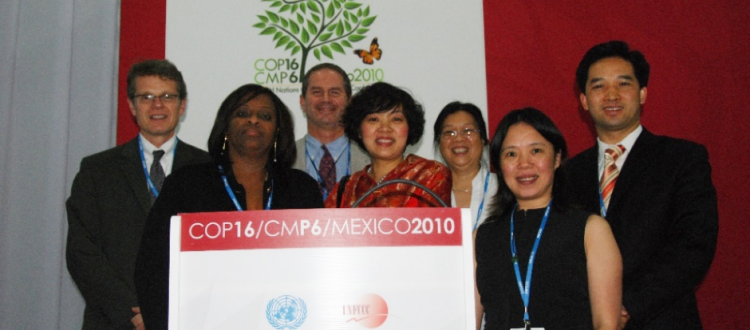COP16: China’s NDRC Calls for Increased Subnational Climate Action
CANCUN (Dec. 6, 2010) – At COP16 in Cancún, Mexico, China’s representative from the National Development and Reform Commission (NDRC), Ms Huang Wenhang, emphasized the need for strengthened cooperation between the US and China in the areas of energy and environment. Ms Huang shared this message when she spoke at the GEI hosted side event entitled “Promoting China-US Subnational Cooperation on Climate Change.”
“Combating climate change requires serious efforts at both the national and local levels. Actions at the provincial and local are particularly important for China in helping it realize its national carbon intensity target.” – Ms. Huang Wenhang, NDRC
The side event was jointly hosted by the Chinese environmental NGO, the Global Environmental Institute (GEI) and its U.S.-based partner and think tank, the Center for Climate Strategies (CCS). In addition to the NDRC, the side event also welcomed the perspective of American policymakers, Chinese civil society and Chinese environmental experts.
China’s NDRC: challenges and opportunities for China’s low-carbon development During her speech, Ms Huang highlighted three important factors for realizing low-carbon development in China:
- Low carbon technology cooperation and transfer, particularly in the power, transportation, construction, industry and agriculture sectors;
- Capacity building and the development of clean energy;
- Explore channels of cooperation between local governments, academic institutions and NGOs.
Looking to the future, Director Huang noted that the NDRC would play a role in facilitating China-US sub-national cooperation at the government level, and will also encourage joint investments by the private sector in clean energy, including new energy sources, energy conservation, biomass energy and new materials sources. As this strategy demonstrates, the NDRC realizes that climate change is both a scientific and economic challenge, requiring significant global effort and cooperation.

GEI’s Mme JIN Jiaman (back second from right) and CCS’ Tom Peterson (back second from left) with the distinguished guests at the COP16. – GEI 2010
Opportunities for Collaboration
Following Director Huang, the speakers largely focused on the opportunity for collaboration and efforts by GEI and Center for Climate Strategies to bring Chinese and American experts to work together.
Mme Jin Jiaman, GEI’s Executive Director, and Mr. Thomas Peterson, CEO and President of CCS, introduced the work of their respective organizations in climate change, along with the partnership between the two organizations launched in 2009, placing particular emphasis on state-province climate cooperation between China and the US.
Director Jin gave a detailed introduction about GEI’s “Symposium on Models for Responding to Climate Change,” held in October 2009, the technical China-US exchange on climate mitigation in July 2010, in which Chinese government officials and climate experts visited three US states, as well as the “Planning Methodology for Provincial Low Carbon Development” training held in Guangdong in November 2010.
Lin Yaojun, Director of the Department of Energy and Climate Change at the Guangdong Development and Reform Commission expressed support for GEI and CCS’ work toward China-US cooperation on climate change, noting that the project has helped Guangdong Province gain a strong understanding of climate action at the US state level. He also expressed hope for further subnational cooperation under frameworks for national cooperation and for a sooner design of a provincial level climate action plan. Director Lin introduced current status in energy consumption and economic growth in Guangdong, as well as the launch of a low carbon pilot in Guangdong as part of the NDRC’s nation-wide initiative.
The work also received support from Ms. Reta Jo Lewis, Special Representative for Global International Affairs at the State Department. Ms Lewis emphasized the need for a global solution to climate change. International cooperation on climate change is a strong priority for the US State Department, particularly with China.
Additionally, Jared Snyder, Assistant Commissioner of the New York State Department of Environmental Conservation, observed similarities between New York State and Guangdong Province in terms of both economic growth and greenhouse gas emission reduction targets. According to Mr. Snyder, this similarity should be encouraging for the two regions to explore avenues for partnership in mitigating climate change.
Finally, Dr. Liao Cuiping of the Guangdong Institute for Energy Conversion under the Chinese Academy of Sciences discussed prospects for China-US sub-national cooperation from a technical standpoint. Dr. Liao emphasized cost-benefit analysis and macro-economic assessment of new climate policies, improving data transparency and availability, and the advantage of multi-stakeholder participation in policy design for Guangdong Province. In addressing the future two-year partnership between GEI, CCS and GIEC, Dr. Liao noted the importance of adapting CCS methodology to a Chinese context in achieving low carbon development in China’s provinces.

